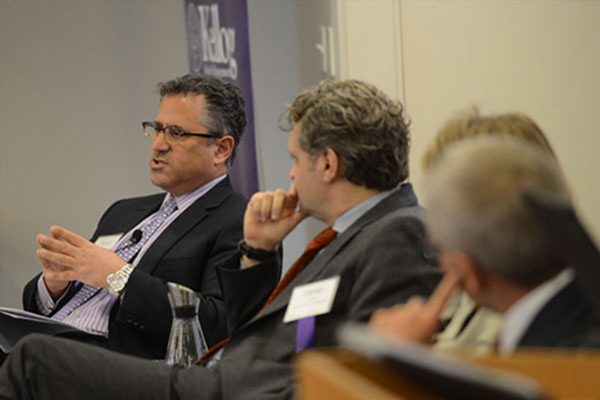Kellogg Experts Share How to go From Activist Target to Change Agent

The following article was originally sourced from the piece “5 Things Companies Need to Know to avoid a ‘Near-Death-Experience’” on Kellogg’s News & Events page.
The Kellogg School of Management-Aspen Business & Society Leadership Summit brought together leaders of government, business, media and non-government organizations with academics to discuss how companies and activists must collaborate to create regulations for a global economy.
Phil Radford of Greenpeace shared that there are times when “you have to give a corporation a near-death experience” to effect change within industries. Here are five things such experiences that could help a company move from activist target to change agent.
1. “Recognize you do not have the public’s trust”
Among the four main types of institutions, NGOs are now the most trusted organizations in the world. Meanwhile trust in businesses and government continually drops.
“The trust gap is growing, and the role that NGOs have been playing in this space has only been increasing,” said Kellogg’s Daniel Diermeier.
2. “Got global operations? Take a close look at your supply chain”
Harlan Loeb, head of global crisis & risk management at Edelman, explained that “companies need to know they will not exist if they don’t have more adaptive and resilient operations and take a far more active role in policy.”
Kellogg’s David Austen-Smith added that, most likely as a result of FoxConn fallout, “Apple is leading the Electronic Industry Citizenship Coalition, which is basically designed to get smelters in Africa to be conflict-free.”
3. “The bigger the company, the more likely a target”
Chris Jochnick of Oxfam said NGOs’ resource scarcity “drives the decision to look for large actors who can influence the corporate sector most broadly.”
Kellogg’s Brayden King pointed out, “What social media can do is create a mini-stage where NGOs can build enough hype that CNN and the Financial Times pay attention.”
4. “Welcome NGOs through the front door, or they’ll come in ‘through the roof'”
Ben Packard, former vice president of Global Responsibility at Starbucks and current director of Corporate Engagements at The Nature Conservancy explained how, “There are a lot of stereotypes between sectors. When talking about governance gaps, people need to know it is more than just carrots and sticks. There are new ways to create value, doorways to open.”
5. “Consider collaboration within your industry to be a ‘pre-competitive issue'”
“Companies are beginning to see sustainability as a pre-competitive issue – something they can work on together, set standards and learn from each other,” said Jason Clay of World Wildlife Fund. “Because they have decided that the reputation of the worst company affects every company in the sector. How they make and sell their products, that’s competitive. Whether they’re given a license to operate in a country, that affects them all. And they all need to address those issues to protect themselves.”
